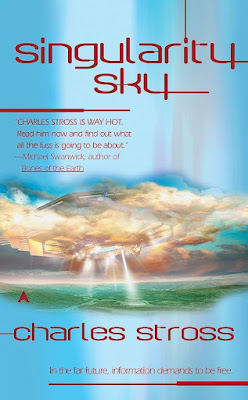Well, I've done it again: started a new Charles Stross series! I've previously enjoyed his near-future cyberpunk "Halting State" and multiple-worlds "Merchant Princes" series. This time I'm jamming on "Singularity Sky", which has a bit more of a Vernor Vinge or Iain Banks feel to it: further out in the future, after humanity has surpassed the limitations of scarcity and is spreading through the cosmos.
I was recently thinking of Stross thanks to a post he made a few years back about why he barely reads science fiction these days. The gist of it is that a lot of SF is built around cool stuff: some spectacular scene or neat encounter that the author wants to create. Stross, though, cares very deeply about the science behind those things: could that encounter physically occur? What would that scene actually look like in the void of space? Obviously this is fiction and there's endless license available, but often it seems like authors aren't aware of and don't care about the various laws they're violating (physical, social, fiscal, etc).
That definitely matches what I've seen in Stross's other novels, which often take a Stephenson-esque pleasure at explaining why things are happening the way they do. One small example I remember is from the Merchant Princes series. In a previous book, a character discovers that hostile government agents have discovered where she lives, and she flees to another world. Much later, she and another character return to that place, and debate whether it is safe to enter and retrieve some records left behind. Is it likely that government agents still have the house under surveillance? The man she's with does some calculations out loud: how much an FBI agent earns in a day, times the two at a time that would be required to keep watch, multiplied by the number of days since she has left... and concludes that there is no way mid-level management would be willing to keep up this cost after several fruitless months and no assurances that she will ever return. They proceed, and find that, yep, the spooks left behind some passive recording devices but no live men in black.
MINI SPOILERS
Singularity Sky similarly thinks deeply about systems: not just cool stuff happening, but how it can come to happen, and what the effects of it happening are. This extends across all sorts of areas and disciplines. So, there's a "Cornucopia Machine" that can create literally anything by reprocessing matter. Okay, cool, so what does that mean? Obviously the existing economy is toast: there's infinite supply and, it turns out, only limited demand. What happens to society in these conditions? Well, it depends on what the society was like prior to receiving the Cornucopia, right? How about a strongly hierarchical, rigid, moralistic society? And then when it comes to space travel, he's very concerned (as is Stephenson) about delta-vee, not merely getting from point A to point B but matching your velocity with point B so you can actually meet it and not smash through or immediately depart.
There are some things that don't have satisfying scientific answers to them, which feels fine here, because Stross acknowledges them and gestures towards the "beyond our ability to comprehend" sign. The big one is how and why humanity has spread across multiple star systems and how to travel and communicate between them. The big force lurking in the background is an entity called Eschaton. Once technology on Earth advanced sufficiently far enough where they (we!) could travel faster than light, 90% of the population instantly disappeared. They were forcibly resettled by the Eschaton, scattered throughout the nearby galaxy. Eschaton delivered a stern message: humanity was NOT to violate causality by traveling at faster-than-light speeds or otherwise playing around with temporal shenanigans.
Limitations lead to creativity, and so we have a whole toolbox of options that are available. Quantum entanglement is one: after a physical box has traveled the far distance, it can "instantly" communicate with its partner box at the point of origin; but only a limited number of times, until the entangled atoms are exhausted. And there's a great deal of expertise around "timelike" space travel: if you curve far out in space, then travel really rapidly, you can make up for the extra distance with a lot less time, while not technically breaking the Eschaton's speed limit.
MEGA SPOILERS
The actual plot is pretty breezy and fun. There's a wide cast of characters, mostly focused on two people from Earth who are visiting the Republic with both overt and covert agendas. The romance angle is a bit brief but satisfying, and nicely raises the stakes for what's already a tense (albeit arguably needless) conflict. The villains all seem pretty two-dimensional, but near the very end there's a small nod towards why people might prefer a rigid and constrained society when overwhelmed by chaos.
END SPOILERS
Like a lot of Stross's work, this was a fun read: quick and entertaining, but with a nice solid-feeling depth beneath it. It looks like there are several other books in this series, and I'm looking forward to checking out more and learning about this future.

No comments:
Post a Comment